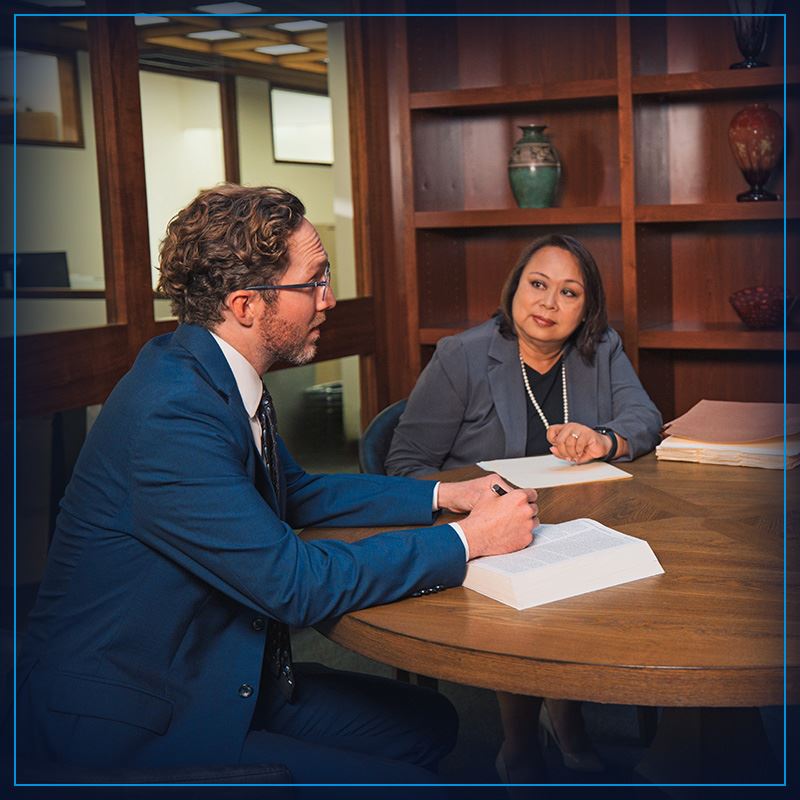
MISDIAGNOSIS & FAILURE TO DIAGNOSE ATTORNEYS IN HAWAII
IMPROPER DIAGNOSIS CAN BE A FORM OF MEDICAL MALPRACTICE
When you are not feeling well, you go to the doctor expecting an explanation about what is happening to you and the appropriate treatment to make you feel better. But sometimes, doctors make diagnostic mistakes. When these mistakes are due to negligence or carelessness and they lead to further health complications, you have a right to pursue legal action.
At Davis Levin Livingston, we assist clients in pursuing medical malpractice claims against healthcare providers that fail in their duty to their patients. Failure to diagnose an illness or disease can have catastrophic results and can even lead to death. You deserve the opportunity to have your voice heard by the Hawaii courts and to get compensation for what was done to you.
Discuss your case with a Hawaii misdiagnosis attorney from our firm today; call (808) 740-0633 for a free consultation.
Key Differences Between Misdiagnosis & Delayed Diagnosis
While these terms are often used interchangeably, they actually represent very different types of medical malpractice.
- Misdiagnosis means that your doctor diagnosed you with the wrong illness and possibly subjected you to incorrect treatment or unnecessary procedures.
- Delayed diagnosis or failure to diagnose means that your doctor didn't provide a diagnosis in a timely fashion, letting your illness worsen, sometimes past the point of treatability.
Reasons for Misdiagnosis or Failure to Diagnose
The specific reason for misdiagnosis or failure to diagnose can vary widely from situation to situation. Your doctor may be under a lot of stress and didn't notice the signs of your illness, they may not have believed that your situation warranted further examination, or maybe your doctor is just careless.
No matter the reason, when a doctor misdiagnoses or delays diagnosing a patient, it is always important to look further into the circumstances surrounding the failure. If it is discovered that the doctor was not doing his or her job correctly, you have a right to pursue damages for this mistake.
Misdiagnosing or failing to diagnose a medical issue can result from:
- Ordering the wrong tests
- Misreading medical tests
- Misreading X-rays
- Failing to order medical tests
- Ignoring symptoms
Problems Caused by Misdiagnosis
Regardless of the reasons for misdiagnosis or failure to diagnose a medical condition, the results can be devastating to patients and their loved ones. Failing to diagnose correctly leads to a loss of treatment time that can mean the difference between life and death.
Incorrect diagnoses also result in serious surgical mistakes. In some cases, a surgeon may spot a suspicious area when operating on a suspected benign cyst, cut into the suspicious tissue, and unwittingly release cancerous cells into a patient’s body.
In other cases, a doctor may operate on a patient based on an incorrect diagnosis, causing permanent physical disability for an individual who never had the injury or illness. In addition, incorrect judgments to incorrect treatments, including surgery, chemotherapy and radiation.
Misdiagnosis and failure to diagnose correctly can cause serious problems for patients because the true issue is missed and patients may undergo unnecessary — and even harmful — treatments that do not address the real problem.
Signs Your Doctor Got Something Wrong
Without a qualified medical opinion, it is often very difficult to tell if your doctor made a mistake in your diagnosis. However, there are a few things you can look for that may tell you something is wrong:
- No improvement from the treatment your doctor prescribed
- The current treatment protocol is leaving you feeling worse than you were before
- Your doctor seems uncertain when he or she talks to you about diagnosis or treatment
- Your doctor is dismissive of your description of your symptoms
These and other questions can help reveal if you are not receiving the proper diagnosis, treatment, and care that you need.
Recent case
Holthaus v. United States, U.S. District Court, D. Haw., No. 88-00074
Parker, 73, began to experience urinary problems and went to an Army medical center. He was examined by Polskin, a family practitioner. Polskin ordered tests of Parker’s urinary tract and diagnosed benign prostatic hypertrophy and possible prostatitis.
A year later, Parker returned to the medical center for additional tests, including a digital rectal examination. During the examination, a surgical resident noted a prostate nodule.
Parker’s urinary problems persisted, and, a year later, he was examined by an urologist at the center. The physician noted an enlarged, hardened, irregular prostate. Although Parker was told to undergo additional prostate evaluation, he delayed further examination for six months. At that time, a needle biopsy, cystoscopy, and circumcision revealed prostate cancer. A month later, a bone scan confirmed that the disease had metastasized and was in terminal stages.
Parker underwent multiple invasive surgeries and experienced severe pain and emotional trauma until his death two years later. Parker, a retired military officer, is survived by his wife and two adult daughters.
Parker’s estate sued the United States under the Federal Tort Claims Act, alleging that its physicians had been negligent for failing to (1) follow up on Parker’s abnormal prostate examinations, (2) timely perform tests to rule out prostate cancer, and (3) diagnose prostate cancer while it was still in the early stages. The complaint also alleged that Parker’s had suffered loss of consortium.
The judge awarded $275,000, including $40,000 for loss of consortium, and added ten-percent prejudgment interest to the award.
Plaintiffs’ Experts:
Joseph Spalding, urology, San Francisco, Cal.
Richard Cohen, oncology, San Francisco, Cal.
Plaintiffs’ Counsel:
Mark S. Davis, Honolulu, Haw.
[The court’s findings of fact and conclusions of law are available through the Offerings section at p. 19, courtesy of Mr. Davis.]
What to Do If You Suspect a Misdiagnosis or Delayed Diagnosis
Seek a Second Opinion
If you are still feeling unwell following diagnosis and treatment, or you are feeling progressively worse as time goes on, your first step should always be to seek a second opinion. Doctors are human and can make mistakes. It can sometimes take visiting two or three additional doctors to get a satisfactory answer to your questions. There is no shame in seeking another doctor’s opinion when you are worried about your health. If there is any question in your mind, go see another medical professional.
Contact a Misdiagnosis/Failure to Diagnose Attorney
If you or a loved one has been improperly diagnosed by a doctor and it caused suffering or death, please contact our Hawaii misdiagnosis/failure to diagnose lawyers as soon as possible. There is a strong possibility that you can pursue damages against the responsible party.
While a successful case will not take back what happened to you, it can help you pay for further medical care, missed work, and the ability to take care of the needs of your loved ones. A successful case can also help protect other patients from a similar outcome.
Please contact us now at (808) 740-0633 to get started. We offer a free initial consultation to discuss your case.


Four Decades of Record Breaking Victories
-
$29,400,000 Medical Malpractice
Physicians at Tripler Army Medical Center failed to order a crucial test that would have detected a twisted gut in a 1-month-old baby, resulting in the loss of 95% of the baby's small intestine and leading to lifelong disability.
-
$9,500,000 Medical Malpractice
Surgeons at Tripler Army Medical Center reattached the small intestine backward during gastric bypass surgery, leading to complications that ultimately resulted in the death of a 31-year-old Army wife and mother of three.
-
$9,000,000 Medical Malpractice
-
$9,000,000 Medical Malpractice
-
$6,500,000 Medical Malpractice
-
$5,600,000 Medical Malpractice
-
$5,000,000 Medical Malpractice
-
$4,250,000 Medical Malpractice
-
$1,800,000 Medical Malpractice

Why Davis Levin Livingston?
-
Available by phone 24/7 & ready to help.
-
Secured tens of millions of dollars on behalf of our clients.
-
Highest malpractice judgment in U.S. history against a military hospital.
-
Includes an experienced medical team including a nursing staff to answer your questions.
-
Mark Davis and Mike Livingston have been recognized as some of the best lawyers in Hawaii.
-
Resources available to advance your expenses; no cost or fees unless Davis Levin Livingston wins your case.

Dedicated Legal Counsel You Can Count On
Helping Families throughout hawaii for over 40 years
-
"Professional, KIND, and understanding"
They are most professional, KIND, and understanding. Thank you Matt Winter for all your help.- Clare T. -
"We wouldn't have chosen any other team!"
Mathew Winter and the whole staff of Davis Levin Livingston guided us every step of the way and made sure we understood everything that was going on. They were always so welcoming and compassionate. Communication was never a problem and emails were answered super fast, especially when we had so many questions. They- Maariel -
"The absolute best firm in Hawaii. Compassion and professionalism at its best!"
Truly a wonderful experience with everyone at the firm. I can't thank you enough for helping provide closure for my family and me during this process. The absolute best firm in Hawaii. Compassion and professionalism at its best!- Daniel -
"After doing extensive research I knew that Davis Levin Livingston was the firm for me due to the success they have had in cases like mine."
After doing extensive research I knew that Davis Levin Livingston was the firm for me due to the success they have had in cases like mine. What surprised me was their personal touch. In the 3- Anthony






.1).1).2401101010550.png)





.1910211111556.png)

.1).1910211114162.png)
.1910211111550.png)